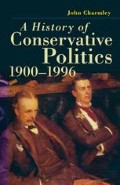Abstract
Despite Labour’s propaganda — and the disappointment of later Conservatives — the Churchill years marked no great change in, but rather a reinforcement of, the prevailing consensus. Butler’s strategy in opposition had been aimed at trying to convince the electorate that the Conservatives could preside over a Welfare State with high public spending, and that there would be no return to the austerity of the 1930s. The Conservatives had fought a campaign which emphasized this theme; as Churchill put it: the nation needed a rest ‘if only to allow for Socialist legislation to reach its full fruition’.1 Nor did the election result suggest that the nation was anxious for any change. More votes had been cast for Labour than for the Conservatives (13,948,605 as opposed to 13,717,538),2 and the Conservatives had a slender majority of 17 seats. If the campaign and the result suggested that a period of consolidation was in order, Churchill was only too happy to oblige.
Preview
Unable to display preview. Download preview PDF.
Notes and References
Dennis Kavanagh, Politics & Personalities (1990), p. 62.
A. Seldon, Churchill’s Indian Summer (1981) p. 426.
Andrew Roberts, Eminent Churchillians (1994), p. 258.
A. Cairncross (ed.), The Robert Hall Diaries 1947–1953 (1989), p. 177.
A. Home, Harold Macmillan, vol. I (1987); Seldon, pp. 250–9.
For example, Ian Gilmour, Inside Right (1977).
Lord Hailsham, The Case for Conservatism (1947), p. 22.
Michael Bentley, ‘Liberal Toryism in the Twentieth Century’, in Transactions of the Royal Historical Society, 1994, esp. pp. 187–91.
Dennis Kavanagh, Politics & Personalities (1990), pp. 42–4.
T. E. Utley, Enoch Powell (1968), p. 66.
Roy Lewis, Enoch Powell: Principle in Politics (1979), pp. 4851 for an analysis.
Lord Moran, Churchill: the Struggle for Survival (1965); see Seldon, pp. 42–54, for some common sense.
John Grigg, ‘Churchill: crippled giant’, Encounter, vol. XLVIII, no. 7, 1977.
Anthony Howard, RAB (1987), p. 222.
Bernard Levin, The Pendulum Years (1969).
See Simon Heffer, ‘Centenary of a Double-Crosser’, Spectator, 5 February 1994, pp. 8–10.
Enoch Powell, ‘Macmillan: The Case Against’, Spectator, 10 January 1987, p. 15.
Margaret Thatcher, The Path to Power (1995), p. 118.
Harold Evans, Downing Street Diary (1981), p. 22.
Julian Amery, ‘…And the Case For’, Spectator, 10 January 1987, p. 16.
Heffer, p. 9 for the last; Alistair Home, Macmillan vol. II (1989), p. 5, for the first.
Home II, pp. 64–5, but also G. Hutchinson, The Last Edwardian at No. 10 (1979).
Enoch Powell, ‘Macmillan: The Case Against’, Spectator, 10 January 1987, p. 15.
D. E. Butler and Anthony King, The British General Election of 1964 (1965), pp. 303–4.
Author information
Authors and Affiliations
Copyright information
© 1996 John Charmley
About this chapter
Cite this chapter
Charmley, J. (1996). A Conservative Consensus?. In: A History of Conservative Politics, 1900–1996. British Studies Series. Palgrave, London. https://doi.org/10.1007/978-1-349-24932-9_8
Download citation
DOI: https://doi.org/10.1007/978-1-349-24932-9_8
Publisher Name: Palgrave, London
Print ISBN: 978-1-349-24934-3
Online ISBN: 978-1-349-24932-9
eBook Packages: Palgrave History CollectionHistory (R0)

